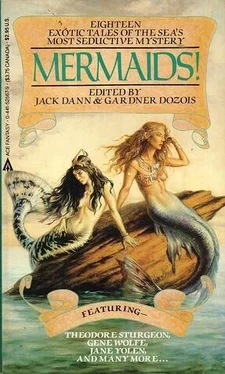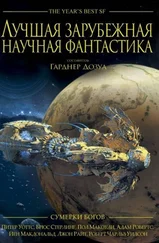Гарднер Дозуа - Mermaids!
Здесь есть возможность читать онлайн «Гарднер Дозуа - Mermaids!» весь текст электронной книги совершенно бесплатно (целиком полную версию без сокращений). В некоторых случаях можно слушать аудио, скачать через торрент в формате fb2 и присутствует краткое содержание. Год выпуска: 1986, ISBN: 1986, Издательство: Ace, Жанр: Фантастика и фэнтези, на английском языке. Описание произведения, (предисловие) а так же отзывы посетителей доступны на портале библиотеки ЛибКат.
- Название:Mermaids!
- Автор:
- Издательство:Ace
- Жанр:
- Год:1986
- ISBN:0-441-52567-9
- Рейтинг книги:5 / 5. Голосов: 1
-
Избранное:Добавить в избранное
- Отзывы:
-
Ваша оценка:
- 100
- 1
- 2
- 3
- 4
- 5
Mermaids!: краткое содержание, описание и аннотация
Предлагаем к чтению аннотацию, описание, краткое содержание или предисловие (зависит от того, что написал сам автор книги «Mermaids!»). Если вы не нашли необходимую информацию о книге — напишите в комментариях, мы постараемся отыскать её.
Mermaids! — читать онлайн бесплатно полную книгу (весь текст) целиком
Ниже представлен текст книги, разбитый по страницам. Система сохранения места последней прочитанной страницы, позволяет с удобством читать онлайн бесплатно книгу «Mermaids!», без необходимости каждый раз заново искать на чём Вы остановились. Поставьте закладку, и сможете в любой момент перейти на страницу, на которой закончили чтение.
Интервал:
Закладка:
Be wary, young sailor,
Of wind and high water.
The sea has a secret,
The sea has a daughter.
She'll swim along starboard,
And capture your heart.
With a flip of her tail-fin,
Underwater, depart.
For George R. R. Martin
because He Is There
The Prevalence of Mermaids
by Avram Davidson
For many years now, Avram Davidson has been one of the most eloquent and individual voices in science fiction and fantasy, and there are few writers in any literary field who can hope to match his wit, his erudition, or the stylish elegance of his prose. His recent series of stories about the bizarre exploits of Doctor Engelbert Eszterhazy (collected in his World Fantasy Award-winning The Enquiries of Doctor Eszterhazy) and the strange adventures of Jack Limekiller (as yet uncollected, alas), for instance, are Davidson at the very height of his considerable powers, and rank among the best work of the seventies. Davidson has won the Hugo, the Edgar, arid the World Fantasy Award. His books include the renowned The Phoenix and the Mirror, Masters of the Maze, Rogue Dragon, Peregrine: Primus, Rork!, Clash of Star Kings, and the collections The Best of Avram Davidson, Or All the Seas With Oysters, and The Redward Edward Papers. His most recent books are Peregrine: Secundus, a novel , Collected Fantasies, a collection, and, as editor, the anthology Magic For Sale.
Here, in an essay published for the first time in this anthology—one of a series of "Adventures in Unhistory" that Davidson has been writing for the past few years, examining curious and little-known areas of history and folklore—Davidson follows the watery trail of the most beautiful and seductive of all supernatural creatures: the mermaid.
My father was the keeper of the Eddystone Light
And he slept with a mermaid one fine night;
The offspring of this strange union were three:
A porpoise, and a porgy, and the third was me.
—Old Sea Shanty
NORMAN DOUGLAS CALLED THEM "PROVOCATIVE CITIZENS OF the deep..." And indeed they are provocative. We all know about the mermaid, "the most pleasing myth of all," as she has been called. Today we perhaps know a little less about her than our ancestors did. To us she is merely the woman who sits on a rock or bobs up in the waves; she carries a mirror in one hand and a comb in another, both for use when she arranges her long green hair; her long green hair is all the cover she has; and she is a woman to the hips and below that she is a nonspecific breed of fish, and she has scales on the fishy part of her. And that is about that.
Formerly there was more. Much more.
Most of which, it seems, is gone.
Mermaids, some of you will be faintly surprised to hear, did not belong exclusively to tales one's grandfather told ("See, my boy? That is a mermaid! And I want you to remember it, because there's no such thing!"), but also belonged to a school of mystical literature; surely you know De la Motte Fouqué's Undine ... You don't? Oh well...
Even before the Age of Reason, we had come to feel a need to anchor the items of the imagination firmly between the rocks of reality, a natural explanation has been sought for every element of legend. Sought for... and, sometimes, found. The dragon has been traced to the crocodile, the werewolf to the rabid dog or to a human bitten by one, the mandrake to an alkaloid, the vampire to a psychosis... and so on. The mermaid, we might as well say, has been traced to the manatee, or sea cow ... but, somehow, she doesn't stay traced. I think that the mermaid's tail, or trail, lies elsewhere. It is true that I, in collaboration with Randall Garrett, once wrote and published a story based on the possibility that, while the manatee may not look much like a mermaid, the mermaid might look much like a manatee. We had her speaking English with a strong Austrilian accent, and she wound up as the first cook in a seafood restaurant somewhere on the coast of California.
It was lots of fun writing it, and, besides the fact that we had mixed up the manatee, or Atlantic Ocean sea cow, with the dugong, or Indian Ocean sea cow, it really was no answer.
Here are some few other items from the grab bag. Gary and Warmington, in their book The Ancient Explorers , say that Nearchus, the pilot-scout of Alexander the Great, heard that "the enchanted Mermaiden's Island of... Astola," "sacred to the Sun" in the Indian Ocean, "was once inhabited by one of the Nereids who made love to all who landed, turned them into fish, and threw them into the sea. But the Sun in pity and anger made them men once more." And a Nereid is defined as "any one of the sea-nymphs held to be the daughters of the sea-god Nereus." Nereus? What happened to Poseidon? Perhaps Nereus was senior in the position, for, we are told, Poseidon was originally a horse-god; and when the ancestors of the ancient Greeks came riding down from the sealess interior they were so impressed by the resemblance the white-maned waves bore to their horses that, thinking the thunder of the waves was caused by horses beneath the sea, they considered the sea to be Poseidon's realm as well. In which case... were the mermaids originally horse-maids? Enough, sir, enough. Onward.
It does seem that the earliest mermaid we have record of was actually a merman, and his picture was even provided for us by the artists of ancient Babylon: he has a full beard, and his name was On —or Oannes . Yes. And he came out of the sea, splashing his fishytail, and he taught the proto-Babylonians the arts of agriculture, handicraft, metallurgy, writing and religion. By day. Day by day. For each night he returned beneath the sea. And if Mr. Von Daniken or his numerous imitators haven't explained to us that On or Oannes was really an ancient astronaut who happened to live in a yellow submarine, why not? Perhaps because the system of writing he taught, that of cuneiform, was probably the worst system of writing ever devised by any god or man. And yet there are those who say that On/Oannes was the origin of mermaids! The fools! Just because he had his picture taken in a bathing suit...
But let us hear what the Reverend Mr. S. Baring-Gould has to say—for he was one of those incredible Victorian clergymen who seemed to have what to say about everything. He says that the wise one, the giver of benefits, who came out of the sea each day and went back into it each night, was none other than the sun itself. "As On, the sun-god, rising and setting in the sea, was supplied with a corresponding moon-goddess, Atergatis ... so the fiery Moloch, 'the great lord,' was supplied with his Mylitta, 'the birth-producer.' Moloch was the fierce flame-god, and Mylitta the goddess of moisture. Their worship was closely united. The priests of Moloch wore female attire, the priestesses of Mylitta were dressed like men." I think that's significant. I'm not sure why I think that's significant, but I do. Probably because it sounds significant. As a matter-of-fact, it sounds like Polk Street on Saturday night, is what it sounds like.
The Rev. Mr. Baring-Gould shows us that this worship had made its way, via, I suppose, Phoenicia, to Carthage and elsewhere in North Africa; doubtless, too, to ancient Greece. And thence? He says that "The prevalence of mermaids"—say, there's a good title! The Prevalance of Mermaids! —"The prevalence of mermaids among Celtic populations indicates these water-nymphs as having been originally deities of these peoples; and I cannot but believe that the circular mirror they are usually represented as holding is a moon-disk." Robert Graves goes him one better; the comb they are usually represented as holding, Graves cannot but believe, represents the plectrum, or pick, with which they used to play their lyre. Remember the sirens' song? It had instrumental accompaniment.
Читать дальшеИнтервал:
Закладка:
Похожие книги на «Mermaids!»
Представляем Вашему вниманию похожие книги на «Mermaids!» списком для выбора. Мы отобрали схожую по названию и смыслу литературу в надежде предоставить читателям больше вариантов отыскать новые, интересные, ещё непрочитанные произведения.
Обсуждение, отзывы о книге «Mermaids!» и просто собственные мнения читателей. Оставьте ваши комментарии, напишите, что Вы думаете о произведении, его смысле или главных героях. Укажите что конкретно понравилось, а что нет, и почему Вы так считаете.











![Гарднер Дозуа - Книга Мечей (сборник) [litres с оптимизированной обложкой]](/books/427839/gardner-dozua-kniga-mechej-sbornik-litres-s-opti-thumb.webp)